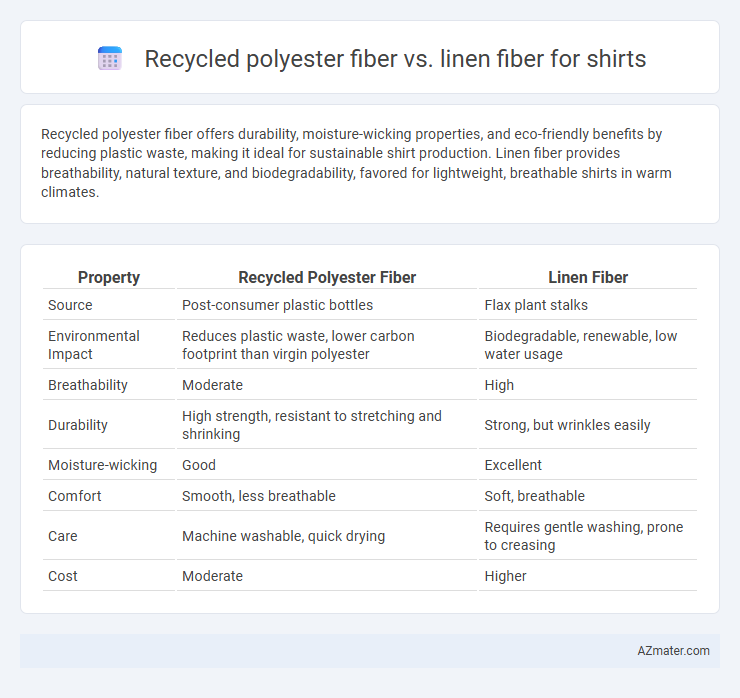Recycled polyester fiber offers durability, moisture-wicking properties, and eco-friendly benefits by reducing plastic waste, making it ideal for sustainable shirt production. Linen fiber provides breathability, natural texture, and biodegradability, favored for lightweight, breathable shirts in warm climates.
Table of Comparison
| Property | Recycled Polyester Fiber | Linen Fiber |
|---|---|---|
| Source | Post-consumer plastic bottles | Flax plant stalks |
| Environmental Impact | Reduces plastic waste, lower carbon footprint than virgin polyester | Biodegradable, renewable, low water usage |
| Breathability | Moderate | High |
| Durability | High strength, resistant to stretching and shrinking | Strong, but wrinkles easily |
| Moisture-wicking | Good | Excellent |
| Comfort | Smooth, less breathable | Soft, breathable |
| Care | Machine washable, quick drying | Requires gentle washing, prone to creasing |
| Cost | Moderate | Higher |
Introduction: Recycled Polyester Fiber vs Linen Fiber for Shirts
Recycled polyester fiber offers durability, moisture-wicking properties, and eco-friendly appeal by utilizing plastic waste, making it a sustainable choice for shirts. Linen fiber, derived from the flax plant, provides breathability, natural antimicrobial traits, and a lightweight texture ideal for warm climates and sensitive skin. Comparing these fibers highlights recycled polyester's strength and moisture management against linen's comfort and biodegradability for optimized shirt performance.
Environmental Impact: Sustainability Comparison
Recycled polyester fiber significantly reduces landfill waste and decreases reliance on fossil fuels by utilizing post-consumer plastic bottles, cutting carbon emissions by up to 75% compared to virgin polyester. Linen fiber, derived from flax plants, is naturally biodegradable and requires minimal pesticides and water, offering a low-impact agricultural footprint. Choosing linen fiber supports renewable farming practices, while recycled polyester promotes circular economy efforts by repurposing plastics, presenting distinct yet valuable sustainability benefits for eco-conscious shirt production.
Material Source and Production Process
Recycled polyester fiber is derived from post-consumer plastic bottles and industrial polyester waste, undergoing melting and extrusion to form new fibers, which significantly reduces environmental impact by minimizing virgin raw material use and landfill waste. Linen fiber originates from the flax plant, requiring harvesting, retting, and scutching processes to extract fibers, which are then spun into yarn, benefiting from natural biodegradability and lower water consumption compared to cotton. The production of recycled polyester is energy-intensive but promotes circular economy principles, whereas linen production relies on sustainable agriculture practices with minimal chemical inputs but involves labor-intensive harvesting and fiber extraction.
Fabric Comfort and Breathability
Recycled polyester fiber offers good moisture-wicking properties but tends to retain heat, making it less breathable compared to natural fibers. Linen fiber excels in fabric comfort and breathability due to its loose weave and natural cellulose structure, allowing superior airflow and moisture absorption. For shirts, linen provides a cooler, more comfortable feel in warm conditions, while recycled polyester is more durable and wrinkle-resistant but may cause overheating during prolonged wear.
Durability and Wear Resistance
Recycled polyester fiber exhibits superior durability and wear resistance compared to linen fiber, making it ideal for long-lasting shirts. Polyester's synthetic nature provides excellent abrasion resistance and maintains its strength through multiple washes, whereas linen, despite its natural breathability and comfort, tends to weaken and develop wear over time. The inherent toughness of recycled polyester ensures enhanced lifespan and minimal pilling, outperforming linen in demanding daily wear scenarios.
Moisture-Wicking and Drying Capabilities
Recycled polyester fiber excels in moisture-wicking due to its hydrophobic nature, drawing sweat away from the skin and facilitating rapid drying, making it ideal for activewear shirts. Linen fiber, while breathable and naturally absorbent, tends to retain moisture longer, resulting in slower drying times and less efficient moisture management. Choosing recycled polyester enhances performance in moisture control and fast drying, whereas linen offers superior breathability but lower moisture-wicking efficiency for shirts.
Aesthetic Appeal and Texture Differences
Recycled polyester fiber offers a smooth, consistent texture with vibrant color retention, providing a sleek and modern aesthetic ideal for contemporary shirts. Linen fiber features a natural, slightly coarse texture with inherent irregularities, delivering a classic, breathable look characterized by subtle wrinkles and a matte finish. The choice between recycled polyester and linen influences both the shirt's tactile experience and visual style, balancing synthetic smoothness against natural rustic charm.
Care, Maintenance, and Longevity
Recycled polyester fiber offers high durability and resistance to shrinking, making it easy to care for with simple machine washing and quick drying, which enhances the shirt's longevity. Linen fiber requires more delicate maintenance, such as gentle washing and air drying to prevent fabric weakening and shrinkage, but it becomes softer and more comfortable with age. While recycled polyester shirts maintain their appearance longer with minimal effort, linen shirts need attentive care to preserve their natural texture and breathability over time.
Cost Analysis: Affordability and Value
Recycled polyester fiber offers a cost-effective solution for shirts, with production costs significantly lower than linen fiber due to its synthetic origin and mass manufacturing processes, making it an affordable choice for budget-conscious consumers. Linen fiber, derived from flax plants, commands a higher price point because of labor-intensive cultivation and processing, yet provides superior breathability and durability that add long-term value. The affordability of recycled polyester supports mass-market access, while linen's premium cost reflects its natural origin and added comfort benefits, influencing the overall value proposition for different consumer segments.
Conclusion: Choosing the Right Fiber for Your Shirt
Recycled polyester fiber offers durability, moisture-wicking properties, and environmental benefits due to its use of post-consumer plastics, making it ideal for activewear shirts. Linen fiber provides breathability, natural texture, and biodegradability, perfect for lightweight, breathable, and eco-friendly casual shirts. Selecting the right fiber depends on your priorities: opt for recycled polyester for performance and sustainability or linen for comfort and natural appeal.

Infographic: Recycled polyester fiber vs Linen fiber for Shirt
 azmater.com
azmater.com